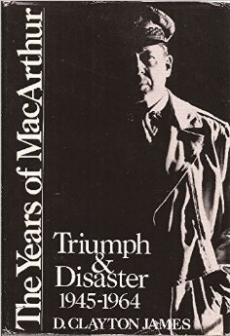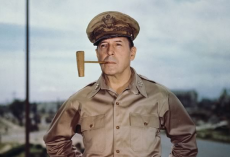
I hope you gained some insight in my book review of William Manchester's American Caesar. In this article I will review Dorris Clayton James' third book in the series which was published after Manchester's unlike his previous two books which inspired much of Manchester's work.
James, Clayton Dorris. The Years of MacArthur: Triumph and Disaster: 1945-1964. (Houghton Mifflin 1985)
As the name suggests James covers the latter years of MacArthur’s career from the end of WWII, through Wake Island, Korea and up to his dismissal by President Truman in 1951 in this third installment of his ‘The Years of MacArthur’ series. Considered by the majority of scholars to be ‘difficult to duplicate or rival’ James has somewhat of a monopoly in this field on scholarly interpretations of MacArthur. As a professor of history at Mississippi University James is certainly a qualified scholar and this is reflected in his well-researched and articulated works. He does not analyse MacArthur to the same length that Manchester did but James considers largely how MacArthur’s dismissal was such a public event and infers that the general purposefully publically criticised the Government in a strive to remain in the lime light. Forever fond of being the centre of attention and convinced he was invincible James suggests that MacArthur wished to leave the scene as he had joined it, kicking and screaming and wholly controversial.
In his approach James writes from a post revisionist perspective on Cold War policy, using the benefit of hindsight in his arguments and citing a plethora of relevant and useful secondary and primary sources. These primary sources are particularly useful because, having written this book some decades after the numerous 1950s biographers of MacArthur, James had some access to material post 70s thaw that had not been available years earlier. Furthermore, he approaches MacArthur’s final actions and the war in Asia with a greater understanding and perspective than most in the field, considering the Cold War and its implications in Europe also and how this influenced the situation in Korea especially. He successfully identifies that one of the major problems with Korea was that the US had no planned foreign policy there or strategic response for when North Korea invaded the South and had they have done, MacArthur would have had far less freedom to pursue his own interests and claim some final glory. James goes further than Manchester and does not just confusingly attribute virtues and vices to MacArthur but understands events and their relevance without exaggerating. Indeed James’ writing style is perhaps less poetic and romantic than Manchester’s style but this serves only to add a certain level of professionalism to this already sensible and well researched book. Although James does make arguments he does not write aggressively and to a degree allows critics to derive what they will from the work. This is very much in the style of post revisionism, providing an argument but carefully avoiding wild accusations James is forever the professional. It is finally worth mentioning that the sheer detail of the notes in his work single him out as superior in his field, indeed Charles Dobbs states that ‘the notes are stunning in their detail.’

Despite the brilliance of Triumph and Disaster there are still limitations inherent as in all works. One main issue is this notion by which James provides evidence but refuses to involve himself too deeply in an argument, instead allowing the interpreter to decide for themselves. Although this can be taken also as a positive, it seems that James is frightened by the notion of contradicting or disagreeing too strongly with the numerous Orthodox and Revisionist historians before him (though the Orthodox applies more in this field) and as a result the finale of many brilliant discussions are unsatisfactory. I would argue that James focuses too much on the objective in his fear of being too subjective. This work is, to date, probably the best and most complete post revisionist thesis on MacArthur and US foreign policy in Korea yet it lacks decisiveness which poses problems for the future. If this sets the precedent for future works then we run the risk of future scholars withdrawing themselves from argument and those willing to debate being labelled ‘old fashioned’ as many orthodox and revisionist historians are.
In light of the above considerations, although James sets the bar high, perhaps too high for many scholars to follow, MacArthur’s Triumph and Disaster is written eloquently and is a credit to the author’s hard work. The somewhat jumbled footnotes of Manchester pale in comparison to the brilliance of James’ notes and extensive bibliography and indeed I would argue that no current published works can match the extent and accuracy of James’ research. James also contributes greatly to this field in furthering Manchester’s considerations of how the success of Inchon clouded MacArthur’s judgement and only increases his arrogance. He even states that MacArthur viewed Truman as a ‘vulgar little clown’.
IMAGE 1: http://ecx.images-amazon.com/images/I/51d0qev83lL._SY344_BO1,204,203,200_.jpg - One possible cover of the book (there are usually many versions with academic books as they are edited and reprinted when new facts are considered.)
IMAGE 2: http://www.history.com/images/media/slideshow/allied-military-leaders/douglas-macarthur.jpg - General Douglas MacArthur.

0 Comment:
Be the first one to comment on this article.